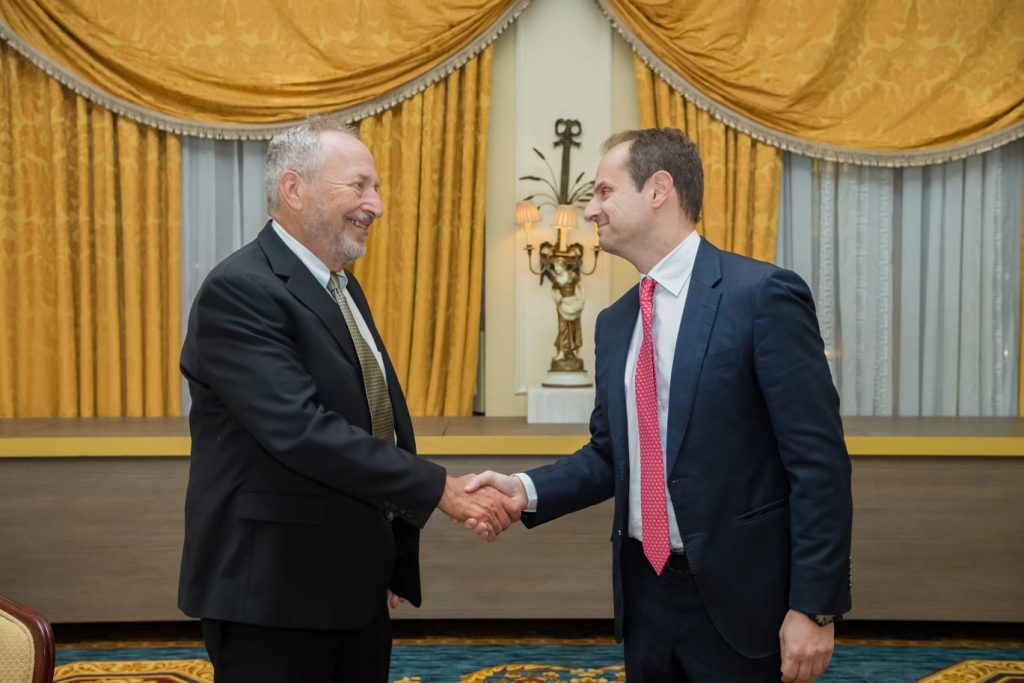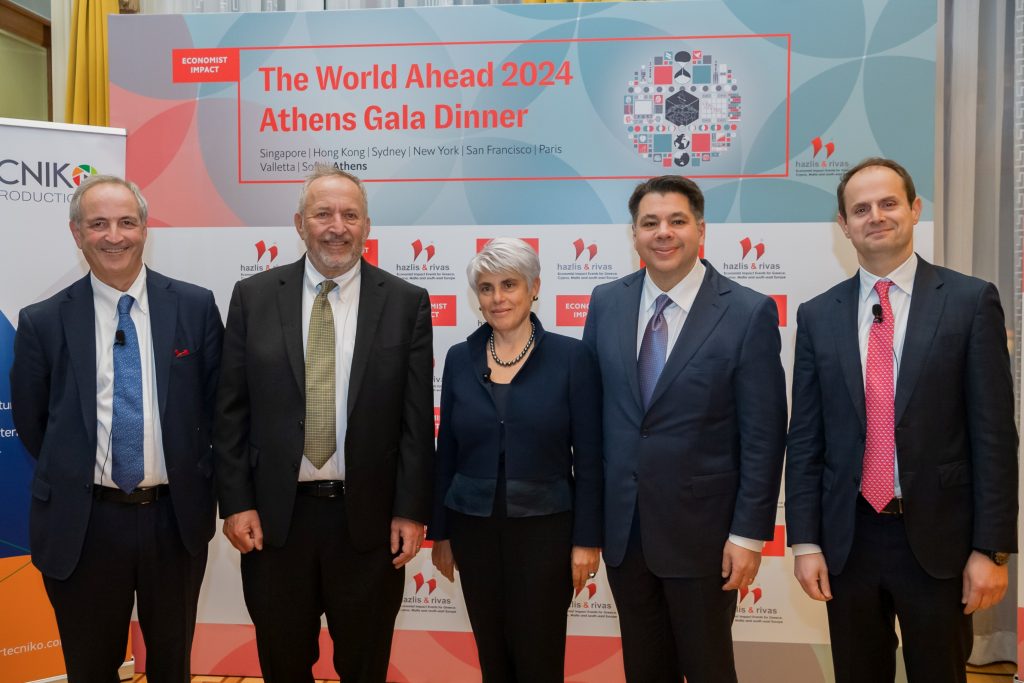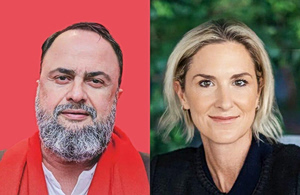A high-profile panel discussion in Athens on Monday brought together former US treasury secretary Larry Summers, Jerry Kalogiratos, the CEO of Capital Product Partners, and Angeliki Frangou, the CEO of Navios Maritime Partners, with the latest developments in the global economy and ocean-going shipping’s challenges amid geopolitical turbulence taking “center-stage”.
The discussion was held ahead of The Economist’s World Ahead Gala Dinner, and moderated by the well-known media group’s executive editor, Daniel Franklin.
US economy
In kicking off the panel discussion portion, Summers, a leading American economist who also served as a prominent president of Harvard, first heaped praise on the host country of Monday’s The Economist event, noting:
“…I am thrilled to have a chance to be back in Greece. I had known that Greece was the country of the year according to The Economist, but I actually asked myself as I was coming here, if you said who ranked as the most improved country over the last decade in the world, you could make a case for Greece. From economic basket case with catastrophic governance; massive loss of confidence; substantial risk of ejection from Europe, to a proud member of the international community,” was the way he painted the Greek recovery.
Asked by Franklin about interest rates, Summers forecast that the Federal Reserve System (FED) in Washington is not likely to cut rates to a significant degree, nor will it start cutting rates soon.
“… I think that’s going to have some impact globally. But I do think we’re in a better place than I would have expected a year ago,” Summers added.
He said risks for the world’s economy emanate from over-optimism by markets, global geopolitical threats, and in the long term by populism, which he characteristically called a “a destroyer of economies”.
Along these lines, the former top Clinton administration Cabinet member didn’t mince his words, warning that a “…second Trump administration would be substantially more dangerous than the first Trump administration was.”
Speaking later during the same discussion, and again on developments in the United States over the recent period, Summers noted that a serious problem now plaguing public debate in America is “the extent and the virulence of antisemitism in the wake of what happened on October 7”, and specifically in universities around the country, something he said he found “shocking”. He was queried over the issue in the wake of the recent resignation of his successor, Claudine Gay, from the post after a backlash over her statements regarding anti-Semitism in the renowned US university.
“The lesson of American history is the power of self -denying prophecy,” he emphasized, before expressing confidence that Joe Biden will be re-elected in this year’s US presidential election.

Former US treasury secretary Larry Summers (left) with Jerry Kalogiratos, CEO of Capital Product Partners.
The war in Ukraine
Asked about the still simmering war in Ukraine some two years after Russia’s invasion, Summers candidly said that “…I think Ukraine is in a tenuous position. And if Ukraine wins the war, there will still be the question of winning the peace.”
At the same time, he said the prospect of using Russian assets as compensation for damages and destruction suffered by Ukraine should be broached, stating that “If the wanton aggression of Russia against Ukraine does not constitute the kind of moment for which that doctrine should be applied, I don’t know what it is. And we are talking about $350 billion. Those $350 billion. in significant part are going to be needed for Ukrainian reconstruction”.
Challenges in global shipping
Speaking about her area of expertise, Navios Maritime Partners CEO Frangou reminded that roughly 90% of global trade is transported by ocean-going shipping, the most efficient way of transport and the reason why war and natural disasters drive up prices, as she said.
At the same time, she cited the shipping industry’s ability to solve problems, specifically pointing to the aftermath of the war in Ukraine, where despite the fact that Europe was “importing 54% of all gas from Russia …we effectively solved it. With money, with effort, but we solved it.”
The head of the Navios shipping group also pointed to the risks now plaguing shipping in the Red Sea, as vessels bypassing the seaway must now extend their journey another 10 days to circumnavigate Africa, an additional distance of more than 30 percent.
“…The supply of vessels is reduced about 5% more. It is not as severe as what we experienced after the pandemic, where the need for goods was so immense and the supply chain had disrupted. I’m not saying that it is insignificant, it is inflationary, but I think its manageable.”
Conversely, she referred to a catastrophic situation in case the Strait of Hormuz is closed, where 20% of the world’s oil and natural gas passes.
Oceans matter for geopolitics once more
In his first comments, Capital Product Partners CEO Jerry Kalogiratos paraphrased a recent Economist article, recalling that “oceans matter for geopolitics once more.”
“I would add: also oceans and obviously shipping. As you say, it is a very important part of the international trade order. And since the Second World War we haven’t seen that type of challenge to the world order, especially in terms of the Law of the Sea.”
The veteran shipping executive cited the tenuous situation for shipping in the Black Sea, this week’s explosion in the Baltic Sea, China and Taiwan tensions, the attacks in the Red Sea, but also the challenge now facing the all-important Panama Canal from the effects of climate change and the “El Nino” phenomenon.
Citing the latter, he said they have “…affected the capacity of the Panama Canal to accommodate shipping. So, for example, US LNG and LPG exports are now forced to predominately take the route of the Suez Canal, which is now the Cape of Good Hope because Suez has its own challenges…freight rates are up by 250% if you want to move a cargo container from Shanghai to Rotterdam.”
The Capital CEO added that as far as the impact is concerned, “…it’s not as significant, in terms of a price hike, compared to what we saw through Covid, but I think we are at the very sensitive point in time where expectations about forward inflation are formed.”
Asked how the increased risks to shipping can be ameliorated, he said the support of national as well as supra-national entities is required to maintain unhindered navigation.

From left: Economist executive editor Daniel Franklin; former US treasury secretary Larry Summers; Navios Maritime Partners CEO Angeliki Frangou; US ambassador to Greece George Tsunis; Capital Product Partners CEO Jerry Kalogiratos.
The challenge of green transition
Queried on the role of shipping vis-à-vis the “green transition”, Frangou said “we have to realize is that the new technology is not here. Unlike the EVs, which were already 20 years in the making. We do not have the new technology. What we can do is…have a younger fleet, where we have invested a lot, which is basically 50% more fuel-efficient, and we also have LNGs for clients who want that. It’s a fuel with less carbon footprint or methanol.”
Speaking on the same subject, Kalogiratos stressed that shipping’s “carbon footprint” is just short of 3%, something he termed as very efficient.
“Of course, this does not mean much, we are at a point in time where each industry has to do what it can to decarbonize,” he said, adding that shipping propulsion systems’ energy efficiency has improved by more than 20% over the last decade to 15 years. “…and at the same point in time we have increasingly more dual-fuel vessels; we’re looking at new fuels and propulsion.”
Kalogiratos also touched on the significant role that shipping can play in the “green economy”.
“…hydrogen, which is expected to play a major role in energy transition and a decarbonized economy going forward, will need to be transported, as its going to be produced far away from the points of consumption. So, blue hydrogen and green hydrogen potentially will be converted into hydrogen carriers, like ammonia or methanol, and this will require, they say, up to 100 new type of ships, very large ammonia carriers to carry that cargo. In addition, there is a whole carbon capture and storage industry…we have been pioneers at that; you have seen these types of vessels appear even in advance of some of these developments, and we expect that shipping like this has been necessary for years in the carriage of hydrocarbons, it will also be a very necessary link in the transportation of new fuels and waste in the green economy.”
Finally, asked on his views regarding “green transition”, Summers first cited a concern over a “massive bubble of optimistic delusion”, saying this frames the issue due to a tremendous gap in necessary financing.
“The private sector says it can put in huge amounts of money, which it can if there are sufficient government guarantees and supports, but the governments don’t have the budget to provide those guarantees and supports. So, there is a massive financing gap that is being papered over. by people who want to look constructive and visionary…but 1 .5 degrees is ludicrous as a goal at this point, and 2 degrees is very unlikely as something that will be achieved,” Summers said.
Conversely, he appeared very optimistic when asked about the progress in AI, underlining that “…the best sentence I’ve heard is this is the first time mankind had a fundamentally new way of knowing since the invention of the scientific method.”



